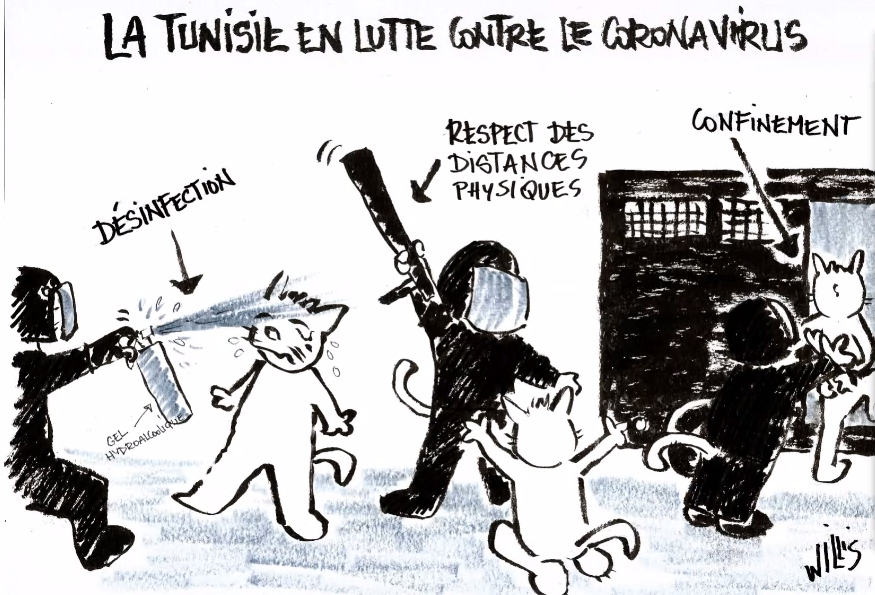Cartooning is a subject that has caused much division and controversy in recent years. Cartoonists have paid with their lives for drawing the Prophet Muhammed. And last year, here in the UK, there was a row about a cartoon in The Guardian that depicted the Home Secretary, Priti Patel, as a cow with a ring through her nose. Some argued that this was racist and anti-Hindu (as cows are sacred animals in Hinduism). Others argued that the whole point of cartoons is to be provocative.
But while cartoonists in the West may feel constrained, and sometimes even fear for their lives, the situation for cartoonists in countries that are less democratic is more serious. I sat down for an interview with the Tunisian cartoonist, Nadia Khiari.
Political Cartoons against State Corruption
I started by asking her what made her want to become a cartoonist. ‘I always loved cartoons … since I was a teenager … it was always my dream to do this since I was a kid’, she replies. But she only started drawing political cartoons after the Tunisian Revolution of 2011.
After 2011, she says ‘I wanted to express myself like any citizen in my country … to criticise power … At that moment, I started drawing political cartoons’. She created a cartoon character called Willis, based on her cat (also called Willis), because, as she puts it ‘cats are a symbol of independence, they don’t obey orders; they’re free … so I took that character to comment on what we were living through during that period’.
I go on to ask her what the situation is like for cartoonists in Tunisia today. She says that before 2011, during the rule of Ben Ali, the internet and newspapers were censored, and if any foreign newspapers (for example French newspapers) criticised Ali, they would be banned in Tunisia. These laws greatly affected Tunisian cartoonists. Khiari gives the example of a female blogger (Fatma Riahi) who was arrested because the authorities thought she was behind a website (whose author used the anonymous name ‘Z’), that published cartoons critical of the regime. But after her arrest, ‘Z’ continued publishing cartoons, proving that Riahi was not behind the blog. She was subsequently released.
Khiari says that in the immediate aftermath of the 2011 revolution ‘we were finally free, and we could express ourselves … criticise the regime’. But she believes that, since then, the country has slid back. ‘Today we still have problems with freedom of speech … right now, we have two bloggers that have to appear in front of a military tribunal because of publications on Facebook. It’s incredible … we are becoming like before [2011]’.
Perhaps this is why she does not like the term ‘revolution’ to describe the events of 2011. ‘A revolution is a total transformation of society’, she says. ‘Ben Ali has gone, but his system is still here … the corruption is still here, the nepotism is still here. So it is not a total revolution’. Khiari also points out that many of the people who worked with Ben Ali are still in politics.
Cartoons as Weapons of Resistance
For Khiari, cartoons are a tool of resistance and they allow her to see the funny side of a terrible situation. ‘I would rather laugh than cry’, she says with a smile. ‘When you laugh at something you are afraid of, you are not afraid anymore’.
In the West, much of the debate surrounding cartoons has been focused on the rights and wrongs of depicting the Prophet Muhammed, and the right to criticise Islam (especially in the aftermath of the Charlie Hebdo massacre). But Nadia makes the point that she is more interested in attacking the corrupt regime in Tunisia than she is in attacking the Islamic faith (which is part of Tunisia’s constitution), since this is where the power lies.
Instead, she concentrates on how religion is used by politicians for their own selfish ends. ‘When I criticise religion in my country … the most important thing is to show how hypocritical politicians can be. They use religion to manipulate people. I show this in my drawings’. In her cartoons, she criticises politicians who claim they are religious but do not conduct themselves in a particularly religious way. ‘I show that there are people who say they are very religious, but then they steal, they lie … I show this paradox and these lies. For me, the enemy is those in power, not the religion’, she affirms. ‘And if they use religion to take power, I will draw something to show it’.
When I ask her what the main issues are in Tunisia, and what subjects she is addressing in her cartoons at the moment, she laughs, wearily: ‘There are so, so, so many problems in my country that I don’t know what to draw’. Like everywhere else in the world, Tunisia has been affected by the coronavirus and has struggled to vaccinate its population. ‘Financially, economically, socially … everything is wrong’, she admits.

But she is not completely pessimistic about the future. For Khiari, young people give her hope. ‘It is very difficult to hope in this moment … but yes, for me, young people are my only hope for the future’. She has worked as a teacher, both with young children and at French universities: ‘I am really happy because I know that they [young people] are aware … they want to fight’.
Interview conducted by Laura Brick (Young Writer for Shout Out UK), as part of the GCRF-funded and AHRC-funded research on Covid in Cartoons, in collaboration with Cartooning for Peace and Shout Out UK.

 Subscribe to fl47's posts
Subscribe to fl47's posts